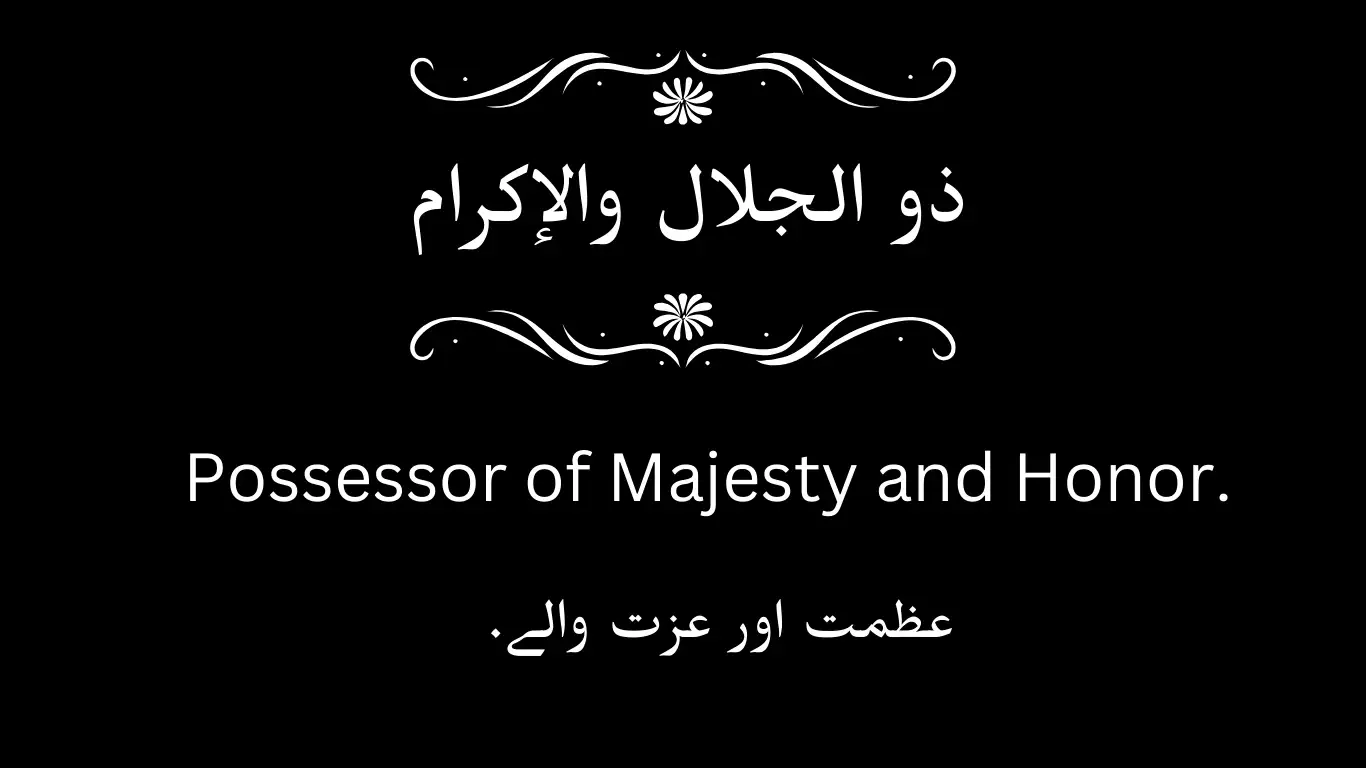Have you ever pondered the attributes of Allah (SWT) that encapsulate His infinite grandeur and benevolence? Ya Zuljalal Wal Ikram, one of Allah’s most profound names, invokes a deep sense of awe and reverence. It beautifully conveys His majesty and generosity, drawing Muslims closer to Him in worship and supplication. In this article, we will explore its meaning, significance, and the wisdom it holds, supported by Quranic verses in Arabic, along with their Urdu and English translations.
| Meaning of Ya Haseebo-The Reckoner | يا حسيبُ |
| What is Ya Ghaniyu Meaning in Urdu and English? |
| What is Ya Salamu Meaning in Urdu and English? |
| Ya Rahman Ya Raheem- The Most Merciful |
What Does “Ya Zuljalal Wal Ikram” Mean?
The phrase “Ya Zuljalal Wal Ikram” is an Arabic expression that translates to “O Possessor of Majesty and Honor.” It reflects Allah’s grandeur, majesty, and generosity. It is a reminder of Allah’s supreme authority and benevolence.
This attribute appears in the Quran and is often recited in prayers and supplications, especially when seeking Allah’s blessings and mercy.
Quranic Reference of “Ya Zuljalal Wal Ikram“
Verse in Arabic:
ذو الجلال والإكرام
English Translation:
“Possessor of Majesty and Honor.”
Urdu Translation:
“عظمت اور عزت والے“
This attribute is mentioned in Surah Ar-Rahman (55:27):
Arabic Verse:
ويبقى وجه ربك ذو الجلال والإكرام
English Translation:
“But the Face of your Lord, full of Majesty and Honor, will remain forever.”
Urdu Translation:
“اور تمہارے رب کی ذات جو عظمت اور عزت والی ہے باقی رہے گی“
This verse emphasizes Allah’s eternal nature, His majesty, and how everything in existence depends on Him.
Significance of “ذو الجلال والإكرام“
1. A Reflection of Allah’s Majesty
- “Ya Zuljalal Wal Ikram” reminds us of Allah’s unparalleled greatness and authority.
- It strengthens the belief that He is the most majestic and honorable.
2. Encourages Supplication
- Muslims often include this phrase in their duas, as it reflects a sense of humility and trust in Allah’s mercy.
3. A Source of Spiritual Connection
- Reciting this attribute helps in building a closer relationship with Allah.
- It acknowledges His infinite power and generosity.
How to Use “ذو الجلال والإكرام” in Daily Life
- In Personal Supplications:
- Begin or end your duas with “Ya Zuljalal Wal Ikram” to invoke Allah’s majesty and mercy. For instance, a mother might use this phrase while praying for the well-being of her children, asking for Allah’s blessings and protection.
- During Dhikr (Remembrance of Allah):
- Repeating “Ya Zuljalal Wal Ikram” during dhikr sessions can bring peace and tranquility to the heart. A famous scholar once shared how incorporating this phrase into his daily remembrance routine helped him find solace during challenging times.
- In Times of Need:
- When seeking Allah’s assistance, reciting this attribute reinforces trust in His power and generosity. There are stories of individuals who, in moments of despair, found immense comfort by reciting this phrase and experiencing a sense of divine support and mercy.
- In Personal Supplications:
- Begin or end your duas with “Ya Zuljalal Wal Ikram” to invoke Allah’s majesty and mercy.
- During Dhikr (Remembrance of Allah):
- Repeating “Ya Zuljalal Wal Ikram” during dhikr sessions can bring peace and tranquility to the heart.
- In Times of Need:
- When seeking Allah’s assistance, reciting this attribute reinforces trust in His power and generosity.
Quranic Verses Highlighting Allah’s Majesty and Generosity
Verse 1: Surah Al-Ikhlas (112:1-4)
Arabic:
قُلْ هُوَ اللهُ أَحَدٌ اللهُ الصَّمَدُ لَمْ يَلِدْ وَلَمْ يُولَدْ وَلَمْ يَكُنْ لَهُ كُفُوْا أَحَدٌ
English Translation: “Say, He is Allah, [Who is] One. Allah, the Eternal Refuge. He neither begets nor is born, nor is there to Him any equivalent.”
Urdu Translation:
“فرمائیں وہ اللہ ہے یگانہ اللہ اور سمد ہے نہ کسی کو جنم نہیں دیا نہ کسی سے پیدا ہوا، اور نہ کوئی اسکا کفوّ ہے“
This Surah encapsulates the uniqueness and majesty of Allah.
Verse 2: Surah Al-Hadid (57:3)
Arabic:
هُوَ الأَوّلُ وَالآخِرُ وَالظَاهِرُ وَالبَاطِنُ وَهُوَ بِكلِ شَيْءٍ عَلِيمٌ
English Translation: “He is the First and the Last, the Ascendant and the Intimate, and He is, of all things, Knowing.”
Urdu Translation: “
وہ پہلا اور آخر اور ظاہر اور باطن ہے اور وہ ہر چیز کا جاننے والا ہے“
This verse reflects Allah’s comprehensive knowledge and eternal nature.
Benefits of Reciting “ذو الجلال والإكرام”
- Inner Peace:
- Repeating this attribute during moments of stress or anxiety can instill a sense of calmness and reliance on Allah.
- Increased Faith:
- It strengthens faith by reminding believers of Allah’s supreme majesty and benevolence.
- Blessings and Mercy:
- Reciting “Ya Zuljalal Wal Ikram” opens the doors to Allah’s endless blessings and mercy.
FAQs
It means “O Possessor of Majesty and Honor,” reflecting Allah’s grandeur, authority, and generosity.
It is mentioned in Surah Ar-Rahman (55:27), emphasizing Allah’s eternal majesty and honor: “But the Face of your Lord, full of Majesty and Honor, will remain forever.
You can recite it during duas to enhance sincerity, include it in dhikr for spiritual peace, or use it in moments of difficulty to invoke Allah’s mercy.
Yes, reciting this phrase with faith and sincerity is believed to attract Allah’s mercy, open doors to blessings, and strengthen your spiritual bond with Him.
A common misconception is that it is only for formal prayers. In reality, it can be recited anytime to connect with Allah, seek His generosity, or as a reminder of His majesty.
Ya Zuljalal Wal Ikram” is a profound reminder of Allah’s majesty and honor. Incorporating this attribute into our prayers and daily lives can enhance our spiritual connection and bring immense peace and blessings.
ذو الجلال والإكرام” Wazaif and Its Benefits
“Ya Zuljalal Wal Ikram” (O Possessor of Glory and Honor) is one of the beautiful names of Allah (SWT). Repeating this name holds immense blessings and benefits, helping individuals achieve inner peace, fulfillment, and closeness to Allah.
Wazifa 1: For Fulfillment of Needs
This wazifa is particularly effective when seeking Allah’s help to fulfill a specific need or resolve a difficulty.
Steps:
- Perform wudu (ablution) and sit in a clean place.
- Begin with Durood Sharif (e.g., Durood Ibrahim) 11 times.
- Recite “Ya Zuljalal Wal Ikram” 313 times with full concentration and sincerity.
- End with Durood Sharif 11 times again.
- Make dua to Allah, presenting your need or problem.
Best Time: After Tahajjud prayer or any quiet time.
Benefits:
- Helps fulfill halal desires and needs.
- Brings ease in financial difficulties.
- Strengthens faith and reliance on Allah.
Wazifa 2: For Inner Peace and Spiritual Growth
This wazifa increases a person’s spiritual connection with Allah and brings peace to the heart.
Steps:
- Perform wudu and find a calm spot for meditation.
- Recite “ذو الجلال والإكرام“ continuously for 15 minutes in a soft and humble tone.
- Reflect on Allah’s greatness and mercy while reciting.
- You may combine this wazifa with Dhikr such as “SubhanAllah, Alhamdulillah, Allahu Akbar.”
Best Time: Anytime during the day or after Fajr prayer.
Benefits:
- Brings tranquility and peace of mind.
- Increases barakah (blessings) in daily life.
- Enhances the love for Allah in the heart.
Wazifa 3: For Marriage or Relationship Harmony
For those seeking marriage or wanting harmony in their existing relationship, this wazifa can bring positive results.
Steps:
- After Isha prayer, recite Surah Al-Fatiha 7 times.
- Follow this with “Ya Zuljalal Wal Ikram” 1000 times.
- End with heartfelt dua for your intention, such as finding a righteous spouse or improving a relationship.
Consistency: Perform this for 7 or 11 consecutive days.
Benefits:
- Helps in finding a pious and compatible spouse.
- Resolves conflicts and misunderstandings in relationships.
- Attracts Allah’s blessings and guidance in marital matters.
Wazifa 4: For Financial Stability
If you are facing financial problems, this wazifa is a powerful way to seek Allah’s help.
Steps:
- Perform two rakats of Salat-ul-Hajat (Prayer for Needs).
- After Salah, recite “Ya Zuljalal Wal Ikram” 500 times.
- Follow it with Surah Al-Ikhlas 3 times.
- End with a dua asking Allah for halal sustenance and financial ease.
Best Time: After Fajr prayer.
Benefits:
- Removes financial hardships.
- Brings barakah in wealth and income.
- Protects from unnecessary expenses and debt.
Important Notes
- Always perform wazaif with pure intentions and trust in Allah’s timing.
- Avoid rushing or reciting mindlessly; focus on the meaning and praise of Allah.
- Combine the wazifa with regular prayers, acts of charity, and repentance for best results.




